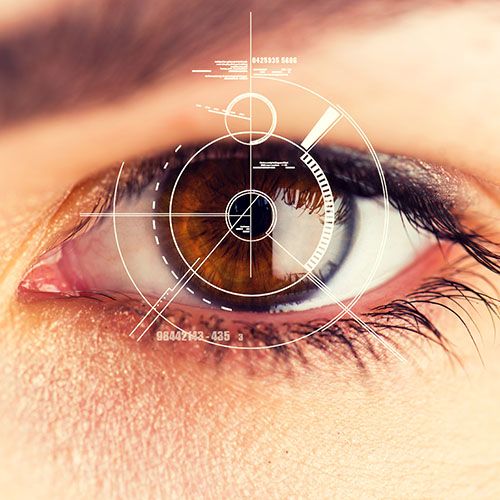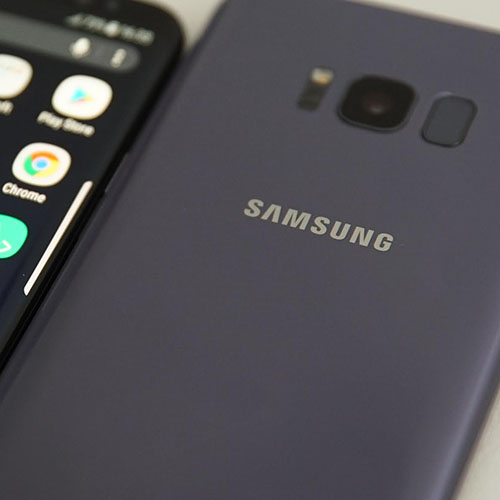The future of phone security
May 19, 2017

Back in the day, if your phone went missing or got stolen, all you would really lose was your Snake top score (don’t get us wrong, that is a genuine tragedy) and a few indecipherable texts from your crush. Now, it’s a whole different story. Phone security is becoming a hot topic in the industry as people increasingly use devices to manage sensitive areas of their life, from finance to dating to work emails.
So, how are our trusty manufacturers tackling our ongoing and ever-growing need for phone security? Here’s where the landscape is heading…
Biometrics
The very sci-fi sounding realm of biometrics is so vogue right now. You’ve heard of it, believe us. It’s basically using something unique about your biological form as a means of identifying you. All the stuff we saw in Star Trek and Philip K. Dick novels back in the day has come true, and now fingerprint sensors and iris scanners are ten-a-penny.
Most high end smartphones like the iPhone 7 and Samsung S8 have an optical imaging fingerprint sensor to speed up the unlocking process. Of course, even the most advanced of these can be fooled if someone really wanted to get into your phone. Although it would take some hardcore fingerprint dusting in order to make it work).
That being said, the new Samsung Galaxy S10 has really ramped up security and brought us the Ultrasonic Fingerprint Scanner. It uses ultrasonic waves to map your fingerprint and analyses it to make sure it’s a match. It even uses anti-spoofing tech to recognise any fake fingerprint attempts. All of this is done in record time and works without a hitch, even in bright light or wet conditions.
These days, fingerprints are the obvious choice for biometrics, so certain brands are testing new boundaries. We’ve seen experiments with voice and facial recognition, for example. Although both are pretty easy to fool, it shows that this is a growing focus in the industry.
We spoke to EMEA’s Chief Digital Officer, John Carney, at February’s MWC about this very topic and his opinion was clear: “Without question, voice activation is rising. If you run with that invisible interface, gestures, your body, your physical form, I think that’s going to be the next playground for interactive services.”

The future of biometrics
The latest experiment for flagship phones is the coveted iris scanner, which features on the newly released Samsung Galaxy S8. A camera and infrared LED work together to take an accurate reading of your iris. Then all you have to do is hold up the phone in front of your eye for it to unlock. It can even be used to verify mobile payments or sign off app download. The coolest bit? Unlike your fingerprints, your iris won’t change over time, so this additional feature is phone security with a capital ‘S’.
Is it possible to take biometrics any further? Seems like developers are now focusing their energy on biorhythms – something unique like your pulse, heartbeat or the sound of your body. This fits into Carney’s prediction that the invisible interface will take precedence, so that the process of unlocking your tech becomes even more seamless and automatic. Because, let’s be honest, we’re all getting a bit tired of pressing our fingers onto a button in order to access our phone.
In all seriousness, with the rise of wearables and health tracking apps, biorhythms could become a realistic option for manufacturers who are looking for the next big development.
Geo-Security
Of course, our bodies don’t solve every problem. Another area that developers are exploring revolves around the idea of location-based security. Banks have been using geo-targeted tracking for years to determine if and when fraud is occurring.
Think about it: you probably spend most of your time at home and at work, yes? So if you’re using your debit card in these locations, it’s likely that the purchases you’re making are kosher. The same principle applies to phone security. Imagine that your phone is automatically set to ‘unlock’ mode when connected to your home or office Wi-Fi. That would be pretty smart, and definitely more achievable as 5G-connected ‘smart cities’ are implemented around the world.

The interesting conundrum with this, however, is when you throw in the idea of connected devices, or, as the industry is terming it, ‘The Internet of Things (IoT).’
The Internet of Things
FutureDial are a company that repurposes old mobile phones and wipes them of data – so security is a big deal for them. Speaking to Thomas Rayas, their SVP of Marketing and Customer Success, it seems that more automatic processes do pose problems in the realm of security.
“In the home, the average person has just one or two devices, for example one is from their employer and one is personal. With IoT and everything that’s attached, that number is going to grow significantly. This is because of the volume of accessories that your phone is attaching to: everything from light switches to thermostats to garage doors to your refrigerator.
“How are people going to keep them up to date? Right now, if you have a smartphone, you interact with a screen which requests an update, and you can easily connect it your computer as well. However, with a dedicated device, you’re probably not interfacing with it, apart from using it for what it was designed to do. So keeping it up to date, keeping tight security, is going to be an interesting challenge.”
Encryption
When it comes to protecting our data, nothing is more fashionable to talk about than encryption. When we think of phone security, we often think of protecting it from thieves and fraudsters. But more recently the conversation has also moved on to discuss the role of privacy, and the rights that people have to keep their phone, and all its content, to themselves.
After Facebook and WhatsApp launched end-to-end encryption of their messaging service, they were lauded for their protection of human rights. Beyond that, there are other steps you can take to ensure the most secure mobile experience possible.
The app 1Password (available from iTunes and on Google Play) manages your passwords securely, with complete encryption, so you can get out of that bad habit of using the same password for everything. It even generates new passwords for you for extra security. LastPass Password Manager (Google Play and iTunes) is also considered the leader in this field. Use it to secure passwords, sign into sites with TouchID and generate new passwords. Bonus: you’ll only need to remember one of them (your LastPass master password).
Two-Step Authentication
What do we think? Well, for us, the mobile phone has begun to play an interesting role in wider security, as part of the two-step authentication process. If in doubt, websites, apps and businesses can send a code to your phone to ensure that they’re speaking to you, and not a robot, or a sneaky thief.
No matter how advanced security becomes, a fully automated service could, in theory, lead to loopholes and leaks. Which means that, even though it’s a pain, getting you to enter a code, a password or to click a button should still be the safest way to protect your data.
Main image via: Getty